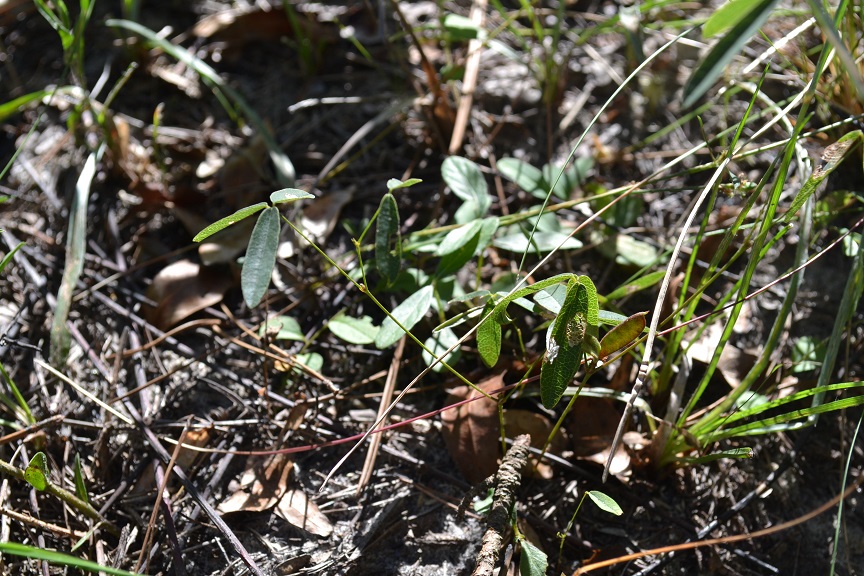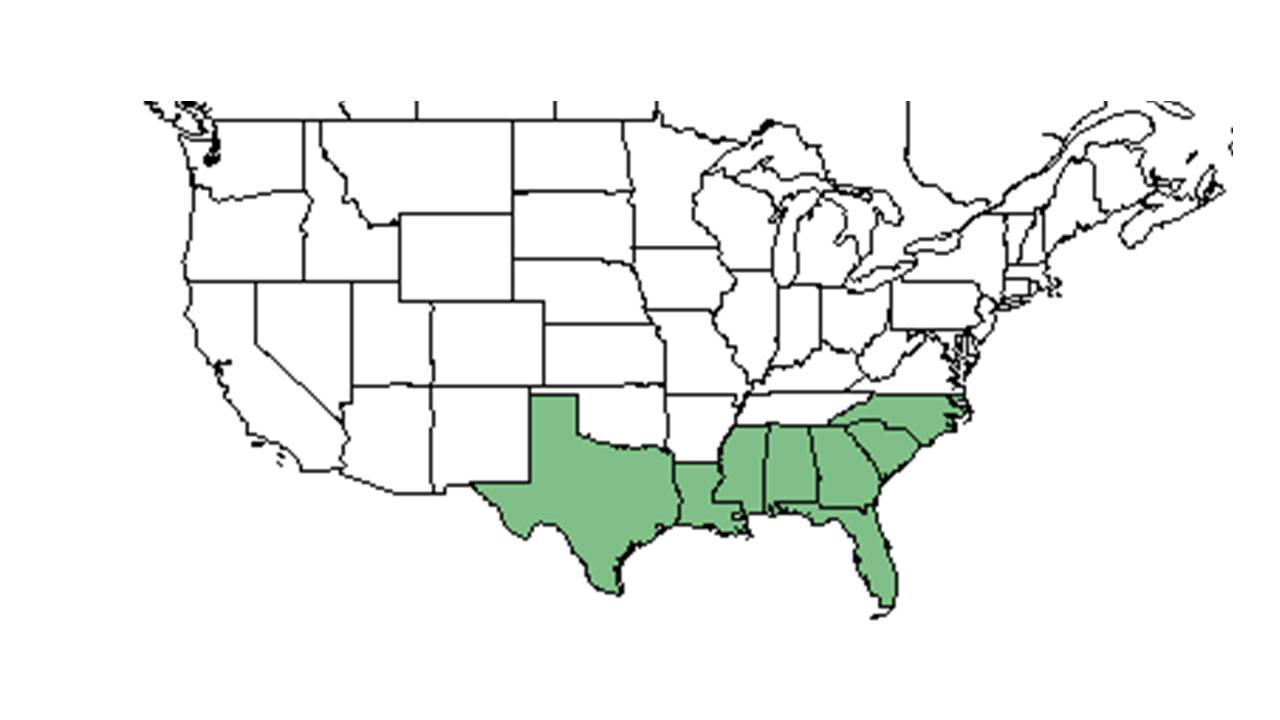Difference between revisions of "Galactia erecta"
| Line 45: | Line 45: | ||
===Fire ecology=== <!--Fire tolerance, fire dependence, adaptive fire responses--> | ===Fire ecology=== <!--Fire tolerance, fire dependence, adaptive fire responses--> | ||
| − | It has been found in recently burned open scrub, and is a characteristic species of various fire-dependent habitats.<ref name=fsu/><ref name= "Carr"/> A study found the mean density of ''G. erecta'' to increase with fire disturbance reintroduction.<ref>Duncan, R. S., et al. (2008). "The effect of fire reintroduction on endemic and rare plants of a southeastern glade ecosystem." Restoration Ecology 16: 39-49.</ref> | + | It has been found in recently burned open scrub, and is a characteristic species of various fire-dependent habitats.<ref name=fsu/><ref name= "Carr"/> A study found the mean density of ''G. erecta'' to increase with fire disturbance reintroduction.<ref>Duncan, R. S., et al. (2008). "The effect of fire reintroduction on endemic and rare plants of a southeastern glade ecosystem." Restoration Ecology 16: 39-49.</ref> Another study by Hiers found lightning-season burns to decrease the duration of flowering (synchrony) in comparison to latewinter/early spring burns or even no burns, and for delay of peak flower activity to increase. Number of flowers increased with burn regiments implemented, but the type of burn did not affect the total number of flowers.<ref>Hiers, J. K., et al. (2000). "The effects of fire regime on legume reproduction in longleaf pine savannas: is a season selective?" Oecologia 125: 521-530.</ref> |
<!--===Pollination===--> | <!--===Pollination===--> | ||
Revision as of 13:34, 13 May 2019
| Galactia erecta | |
|---|---|

| |
| Photo taken by Kevin Robertson | |
| Scientific classification | |
| Kingdom: | Plantae |
| Division: | Magnoliophyta - Flowering plants |
| Class: | Magnoliopsida – Dicotyledons |
| Order: | Fabales |
| Family: | Fabaceae ⁄ Leguminosae |
| Genus: | Galactia |
| Species: | G. erecta |
| Binomial name | |
| Galactia erecta (Walter) Vail | |

| |
| Natural range of Galactia erecta from USDA NRCS Plants Database. | |
Common name: Erect milkpea
Contents
Taxonomic notes
Description
This plant is erect[1].
Generally, the genus Galactia are "trailing or twining, climbing, perennial, herbaceous or woody vines or erect, perennial herbs or rarely shrubs. Leaves 1-pinnate, usually 3-foliolate (or rarely 1-,5-7-,9-folilolate); leaflets entire, petiolulate, stipellate. Racemes axillary, pedunculate with few to numerous, papilionaceous flowers borne solitary or 2-several at a node, ech subtended by a bract and fusion of the 2 uppermost, with the laterals usually shorter than the uppermost and lowermost; petals usually red, purple, pink or white; stamens diadelphous or elsewhere occasionally monadelphous; ovary sessile or shortly stipitate. Legume oblong-linear to linear, few-many seeded, compressed, straight or slightly curbed, dehiscent with often laterally twisting valves."[2]
Specifically, for G. erecta species they are "erect perennial with glabrous or sparsely pubescent stems, mostly 2-4 dm tall. Leaves 3-foliolate with rachis 1-2 mm long; leaflets linear-oblong to oblong or elliptic, mostly 1.5-4 cm long, glabrous. Racemes 1-2 cm long, subsessile; flowers 1-6, on short-pubescent pedicels 1-3 mm long subtended by triangular-subulate bracts 1-1.5 mm long; bractlets triangular-to linear-subulate, 1-2 mm long. Calyx appressed short-pubescent, tube 2-3 mm long, lobes 2-3 mm long; petals pale purple to white, the standard 7-8 mm long. Legume 2-4 cm long, 5-8 mm broad, 6-10 seeded, with short-pubescent valves and sutures." [2]
Distribution
G. erecta is distributed from southeast North Carolina south to the panhandle of Florida, and west to eastern Texas.[3]
Ecology
Habitat
Generally, G. erecta can be mostly found in sandhills within the southeastern coastal plain.[3] This species has been found in open longleaf pine-wiregrass flatwoods along gum swamps, wiregrass savannas, pine-oak upland forests, and clearings within pine flatwoods. This species does well in open light environments in dry loamy sands, drying sand, and sandy-peaty wet soils.[1] It is considered an indicator species of the Florida panhandle silty longleaf woodlands habitat as well.[4]
Associated species seen growing with Galactia erecta include Pinus palustris, Pinus elliotii, Aristida stricta, Quercus species, Tephrosia florida, Aristida, Croton, Berlandiera, Asclepias, Tetragonotheca, Galactia mollis. [1]
Phenology
G. erecta has been observed to have corolla white or light yellowish flowers.[1] “A purple flowered perennial herb about 1 foot high, occurring in dry pine lands of the Coastal Plain from north Carolina to Louisana. Seeds have been recorded from stomach of a single bobwhite.”[5] It has been seen flowering from April to August with peak inflorescence in May and June.[1][6] It has been observed fruiting from June to July and in September.[1]
Seed dispersal
This species is thought to be dispersed by gravity. [7]
Fire ecology
It has been found in recently burned open scrub, and is a characteristic species of various fire-dependent habitats.[1][4] A study found the mean density of G. erecta to increase with fire disturbance reintroduction.[8] Another study by Hiers found lightning-season burns to decrease the duration of flowering (synchrony) in comparison to latewinter/early spring burns or even no burns, and for delay of peak flower activity to increase. Number of flowers increased with burn regiments implemented, but the type of burn did not affect the total number of flowers.[9]
Use by animals
Species in the genus Galactia have been observed to be eaten by gopher tortoises (Gopherus polyphemus).[10]
Conservation and management
It is listed as G4 on the global scale due to its restricted distribution. G. erecta is also critically imperiled in Texas as well as vulnerable in North Carolina.[11]
Cultivation and restoration
Photo Gallery
References and notes
- ↑ 1.0 1.1 1.2 1.3 1.4 1.5 1.6 Florida State University Robert K. Godfrey Herbarium database. URL: http://herbarium.bio.fsu.edu. Last accessed: June 2014. Collectors: Loran C. Anderson, John B. Nelson, R.K. Godfrey, Washington, Loran C. Anderson, Rodie White, William B. Fox, H. L. Blomquist, Sidney McDaniel, H. R. Reed, R. L. Wilbur, Samuel B. Jones, F. H. Sargent, Harry E. Ahles, J. Haesloop, and R. Kral. States and Counties: Florida: Wakulla, Jackson, Bay, Walton, Liberty, and Gadsden. Georgia: Thomas, Baker, and Dodge. North Carolina: Bladen and Onslow. Mississippi: George, McNeill, Lamar, and Pearl River. Alabama: Baldwin and Clarke.
- ↑ 2.0 2.1 Radford, Albert E., Harry E. Ahles, and C. Ritchie Bell. Manual of the Vascular Flora of the Carolinas. 1964, 1968. The University of North Carolina Press. Print.
- ↑ 3.0 3.1 Weakley, A. S. (2015). Flora of the Southern and Mid-Atlantic States. Chapel Hill, NC, University of North Carolina Herbarium.
- ↑ 4.0 4.1 Carr, S. C., et al. (2010). "A Vegetation Classification of Fire-Dependent Pinelands of Florida." Castanea 75(2): 153-189.
- ↑ Graham, E. H. (1941). Legumes for erosion control and wildlife. Washington, USDA
- ↑ Nelson, G. PanFlora: Plant data for the eastern United States with emphasis on the Southeastern Coastal Plains, Florida, and the Florida Panhandle. www.gilnelson.com/PanFlora/ Accessed: 9 DEC 2016
- ↑ Kirkman, L. Katherine. Unpublished database of seed dispersal mode of plants found in Coastal Plain longleaf pine-grasslands of the Jones Ecological Research Center, Georgia.
- ↑ Duncan, R. S., et al. (2008). "The effect of fire reintroduction on endemic and rare plants of a southeastern glade ecosystem." Restoration Ecology 16: 39-49.
- ↑ Hiers, J. K., et al. (2000). "The effects of fire regime on legume reproduction in longleaf pine savannas: is a season selective?" Oecologia 125: 521-530.
- ↑ Birkhead, R. D., et al. (2005). "Patterns of folivory and seed ingestion by gopher tortoises (Gopherus polyphemus) in a southeastern pine savanna." American Midland Naturalist 154: 143-151.
- ↑ [[1]] NatureServe Explorer. Accessed: May 13, 2019